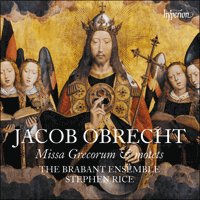Texte paru dans: / Appeared in:
Hyperion |
|
|
Reviewer: J.
F. Weber
With the 18th Mass of Jacob
Obrecht (1457/58–1505) to be recorded, we are making slow progress toward a
complete collection of his Masses, which number 32 or so. As noted before,
Du Fay’s anniversary (1974) was greeted with new recordings of the seven
Masses that had been edited in the old Complete Works, and Ockeghem’s
anniversary (1997) was marked by Edward Wickham’s new recordings of all 15
Masses (though several CDs were a bit late in appearing). But 2005 is long
gone and Obrecht’s admittedly much larger output of Masses is still lagging
behind. His reputation had been more obscure in modern times, but by 1994,
when Rob Wegman’s Born for the Muses appeared, he was well on his way to
being ranked with his contemporaries Josquin and Ockeghem (as were Pierre de
la Rue and Heinrich Isaac also). Wegman added Missa de Sancto Johanne
Baptisto to the 31 Masses published in the New Obrecht Edition, but a couple
of Masses deserved no more than a single footnote. The added Mass is found
in Vatican Sistine 160 and was published in 1982, though not in the NOE.
Wegman finds it impossible to
establish a clear chronology for Obrecht’s Masses (and even raises the
question of how important such a chronology might be). But he discusses
their style, from early to late, and the recorded Masses cover the span of
styles. János Bali recorded two of the earliest Masses stylistically (O
lumen ecclesie and Sicut spina rosam), while all four Masses that Wegman
discusses last have been recorded, the most duplicated of all being Missa
Sub tuum presidium. This Missa Grecorum is the last one he can date before
1591, and it falls in the middle of three layers that he discerns as the
mature style of that time (that is, before the final four Masses). Some
Masses can be firmly dated, but the rest cannot be dated well enough to fill
in the gaps.
The title of this one is
suggestive of Masses for given occasions such as festum asinorum (January
1); the festum grecorum fell on Easter Monday, welcoming the newcomers to
the choir school. What the newcomers have to do with the Greeks is
unexplainable, but in Rome Greek was used in some parts of the Easter Sunday
Mass. A snatch of the Easter sequence is heard in the Mass, and it is heard
complete in the Agnus Dei. But Obrecht had no connection with Rome, so the
explanation does not solve the mystery.
Before giving us the Mass and
four other sacred works that have likewise not been recorded before, Rice
begins his program with the Salve Regina à6, one of the most familiar of the
composer’s motets. He seems to be inviting comparison with such stalwarts as
Paul Hillier on Ars Nova, Peter Phillips (22:3), Jeremy Summerly (21:6),
Edward Wickham (25:1), and Rebecca Stewart on Jubal, not a weak performance
in the lot. He matches the best of them, all within a narrow range of
tempos. Rice is the broadest of the six but only by a few seconds, while
Wickham is the fastest but only a minute shorter than Rice. The comparison
is useful, since Rice has chosen unrecorded music (and even unrecorded
composers) for his projects, so this time we can measure his success. For
the rest, the brief pars prima of O beate Basili was recorded in an
historical series on the Pléiades label in the 1960s. Cuius sacrata viscera,
a fragment of a hymn, is less than two minutes long. Mater Patris, like O
beate Basili, is in three parts, as lengthy as the Salve Regina. The
separate Agnus Dei is anonymous in its only source, the Wrocław Codex, but
Wegman has attributed it to Obrecht on the usual stylistic grounds. The
Brabant Ensemble is made up of 14 mixed adult voices, matching the size and
makeup of the three most recent versions of the Salve Regina, which range
from 12 to 16 voices. The group continues its superlative level of
performance, which I have admired since its first appearance (Clemens non
Papa in 29:1). This is the 17th disc in a steady stream of one or two issues
every year from this dependable ensemble. Remarkably, eight of the singers
who participated in that first recording are still with the group. I can’t think of another early composer who has been given three editions of his works in modern times. Obrecht’s Werken was edited by Johannes Wolf from 1908 to 1921. Opera Omnia Editio Altera was edited by Albert Smijers and Marcus van Crevel from 1954 to 1964. The New Obrecht Edition (used for this recording of the Mass) was edited by Chris J. Maas and six other editors from 1983 to 1999; it consists of 14 volumes of Masses, two of motets, and two of everything else. Among recommended late Masses are Missa Sub tuum praesidium (Edward Wickham, 27:4), Missa Maria zart (Peter Phillips, 19:6), Missa Si dedero (with Missa Pfauenschwanz, János Bali, 24:6), and Missa Cela sans plus (with two earlier Masses, Bali, 29:5). Three other Masses in mature style are Missa Malheur me bat (Wickham, 21:6), Missa Fortuna desperata, and Missa Rose playsante (both from The Sound and the Fury on fra bernardo). Missa Fortuna desperata, represented long ago by Noah Greenberg and René Clemencic, is long overdue for a new version. But for now, don’t miss this superb Missa Graecorum and four unique recordings of other works. It deserves the highest recommendation. | |
|
|
|
|
|
|
|
Cliquez l'un ou l'autre
bouton pour découvrir bien d'autres critiques de CD |
|




